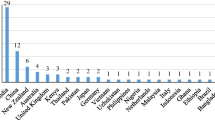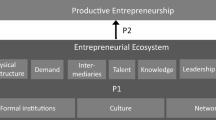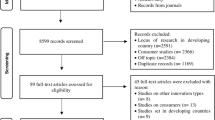Abstract
Historically, farmers have been amongst the most innovative people in the world. However, agriculture now lags behind other sectors in its uptake of new information technologies for the control and automation of farming systems. In spite of decades of research into innovation, we still do not have a good understanding as to why this is the case. With the globalisation of food markets, IT adoption in agricultural communities is perceived to be increasingly important by policy makers. As the most marginalised of rural communities, it is self-evident that agricultural communities in less developed countries are most in need of these systems. This paper proposes a new integral systems framework of e-agricultural adoption and innovation in less developed countries. It opens up a new avenue of research for control and automation systems theory and practice, which informs policy in respect of e-readiness of rural communities.

Similar content being viewed by others
Notes
Irish Scientific Research Institute www.teagasc.ie
Irish Farmers Association www.IFA.ie
References
Barile S (2012) Reflections on service systems boundaries: a viable systems perspective: the case of the London Borough of Sutton. Eur Manag J 30(5):451–465
Baxter G, Sommerville I (2011) Socio-technical systems: from design methods to systems engineering. Interact Comput 23(2011):4–17
Borgmann A (2000) Holding onto reality. The University of Chicago, Chicago
Brown JS, Duguid P (1991) Organizational learning and communities-of-practice: toward a unified view of working, learning, and innovation. Organ Sci 2(1):40–57
Bulz N, Ginestet A, Durand S, O’Dowd Smyth C, Wilenius M (2012) Towards a new agenda for systems engineering and international stability. In: Stapleton L (ed) Proceedings of the international federation of automation and control international conference in international stability and systems engineering (SWIIS 2012), Elsevier, North Holland, also available at IFAC-PapersOnLine, ISBN 978-3-902823-20-5
Carew P, Stapleton L (2012) A human-centred analysis of systems development goals, rationality and focus using principal components analysis and hierarchical clustering. SWIIS (forthcoming)
Carew P, Stapleton L, Byrne G (2008) Implications of an ethic of privacy for human-centred systems engineering. Artif Intell Soc 2203:385–403
Checkland P (1999) Systems thinking, systems practice: includes a 30-year retrospective. Wiley, New York
Checkland P (2001) Soft systems methodology. In: Rosenhead J, Mingers J (eds) Rational analysis for a problematic world revisited. Wiley, Chichester
Connolly R (2010) Commissioned Report: Examining Technology Adoption & Usage among Farmers in Ireland, Committee for Uptake of ICT. Dept of Agriculture Fisheries and Food, Ireland
Cooley M (1987) Architect or bee? The human price of technology. The Hogwarth Press, London
Corea S (2000) Cultivating technological innovation for development. Electron J Inf Syst Dev Ctries (EJISDC) 202:1–15
Davis F (1989) Perceived usefulness, perceived ease of use, and user acceptance of information technology. MIS Q 130(3):319–340
Eckert P (2006) Communities of practice. ELL 2:683–685
Feder G (1985) The relation between farm size and farm productivity: the role of family labor, supervision and credit constraints. J Dev Econ 18(2):297–313
Feder G, Umali L (1993) The adoption of agricultural innovations: a review. Technol Forecast Soc Chang 43(3–4):215–239
Freeman A, Stapleton L (2008) Systems security problems and cultural meanings in control and automation systems: empirical evidence for value conflicts in systems engineering. In: Proceedings of the international federation of automation and control triennial world congress, Seoul
Gakuru M, Winters K, Stepman F (2009) Innovative farmer advisory services using ICT. In: W3C workshop perspective on the role of mobile technologies in fostering social development. Africa
Garibaldo F, Rebecchi E (2012) Needs and desires: transcending the bi-polar tendency. AI Soc, Online First, 10 Feb 2012
Gelb E, Voet H (2009) ICT Adoption trends in agriculture: a summary of the EFITA ICT adoption questionnaires (1999–2009). In: EFITA conference ‘09. Proceedings of the 7th EFITA conference, Wageningen, The Netherlands, 6–8 July 2009
Gill K (2002) Knowledge networking in cross-cultural settings. AI Soc 16:252–277
Gill K (2012) Human machine symbiotics: on control and automation in human contexts. In: Stapleton L (ed) Proceedings of the international federation of automation and control international conference in international stability and systems engineering (SWIIS 2012), Elsevier, North Holland, also available at IFAC-PapersOnLine, ISBN 978-3-902823-20-5
Jorgensen A (2006) Fields of knowledge. http://esource.dbs.ie/handle/10788/296. Accessed Mar 2012
Kroeber AL (1952) The nature of culture. University of Chicago Press, Chicago
Langdon (1993) Upon opening the black box and finding it empty: social constructivism and the philosophy of technology, science, technology, & human values, 1803: 362–378 Published by: Sage Publications, Inc
Lave J, Wenger E (1991) Situated learning: legitimate peripheral participation. Cambridge university press
Lesser EL, Storck J (2001) Communities of practice and organizational performance. IBM Syst J 40(4):831–841
Martin D (2012) An inquiry into human nature and the cost of the wealth of nations: addressing global systems failure through an integral systems paradigm for sustainable development. In Stapleton L (ed) Proceedings of the international federation of automation and control international conference in international stability and systems engineering (SWIIS 2012), Elsevier, North Holland
Mumford E (2003) Redesigning human systems. Idea Publishing
Murphy F (2008) A Human-Centred Framework For Eliciting Users’ Embedded Knowledge Requirements During Information Systems Development, Ph.D. Thesis, INSYTE Centre, Waterford Institute of Technology, Ireland
Murphy F, Stapleton L (2005) Managing tacit knowledge in ISD methodologies. In: Vaselicas O, Wojtowski W, Wojtowski G (eds) Information systems development: advances in theory, practice and education. Kluwer Academic Press/Plenum
Nelson R, Winter S (1982) An evolutionary theory of economic change. Belknap press of Harvard University, Cambridge
Orlikowski W, Iacono C (2001) Research commentary: desperately seeking the “IT” in IT research—a call to theorizing the IT artifact. Inf Syst Res 1202:121–134
Ovaska P, Stapleton L (2010) Requirements engineering during complex information systems development: case study of an international ICT company. J Inf Technol Case Appl Res (JITCAR) 12(2):36–59
Polanyi M (1966) The logic of tacit inference. Philosophy 41(155):1–18
Prokopy LS, Floress K, Klotthor-Weinkauf D (2008) Determinants of agricultural best management practice adoption: evidence from the literature. J Soil Water Conserv 6305:300–311. doi:10.2489/jswc.63.5.300
Ramli R, Zakaria N, Mustaffa N, Sumari P (2012) Privacy issues in a psychiatric context: applying the ISD privacy framework to a psychiatric behavioural monitoring system. In: Proceedings of the international federation of automation and control international conference in international stability and systems engineering (SWIIS 2012)
Rasmussen LB (2007) From human-centred to human-context centred approach-looking back over ‘the hills’, what has been gained and lost? AI Soc 21:471–495
Rogers E (2003) The diffusion of innovations, 5th edn. Free Press, New York
Rosenbrock HH (1990) Machines with a purpose. Oxford University Press, New York. ISBN:0-19-856346-9
Samolienko S (2008) Contributing factors information technology investment utilisation: an empirical study. Inf Technol Dev 14(1):52–75
Schein EH (2006) Organizational culture and leadership, vol 356. Jossey-bass, San Francisco
Schumpeter J (2009) Essays: on entrepreneurs, innovations, business cycles, and the evolution of capitalism, 11th edn. Transaction Publishers, New Jersey
Scott WR (2001) Institutions and organizations, 2nd edn. Sage, Thousand Oaks
Selznick P (1996) Institutionalism ‘old’ and ‘new’. Adm Sci Q 41(2):270–277
Stapleton L (1999) Information systems development as interlocking spirals of sensemaking. In: Zupancic J, Wojtkowski W, Wojtkowski WG, Wrycza S (eds) Evolution and challenges in systems development. Kluwer Academic/Plenum Publishers, New York
Stapleton L (2003) ‘Information systems and automation technology as social spaces’, in Brandt. Et. Al., Human centred issues in advanced engineering. Elsevier, North Holland
Stapleton L (2006) Modes of reasoning in theories of the social impact of advanced technologies: a critique of ERP systems in healthcare. Annu Rev Control 30:243–253
Stapleton L (2011) Technology adoption in post-conflict regions: EDI adoption in Kosovo after the war. J Glob Inf Manag 1903:65–84
Stapleton L (2013) Zarathustra and beyond: exploring culture and values online. Artif Intell Soc 28(1):95–105
Stapleton L, Byrne G (2008) The use of an axiological lens to review globalised automation and control systems projects. In: Proceedings of the international federation of automation and control triennial world congress, Seoul
Stapleton L, Fouopi Lemouchele A (2011) The adoption of electronic data interchange in Africa: a country case study of the Cameroon through an institutional lens. In: Proceedings of the international federation of automation and control world congress, Catholic University of Milan, Aug 2011
Stapleton L, Smith D, Murphy F (2005) A human-centred systems approach to the management of tacit knowledge. Artif Intell Soc 1902:159–179
Tornatzky L, Klein J (1982) Innovation characteristics and innovation adoption-implementation: a meta-analysis of findings. IEEE Trans Eng Manag EM-29:28–45
Warren M (2004) Farmers online: drivers and impediments in adoption of Internet in UK agricultural businesses. J Small Bus Enterp Dev 11(3):371–381. doi:10.1108/14626000410551627
Warschauer M (2004) Technology and social inclusion: rethinking the digital divide. The MIT Press, Cambridge
Weick K (1995) Sense-making in organisations. Sage Publications, CA
Wenger E (1999) Communities of practice: learning, meaning, and identity. Cambridge university press, Cambridge
Wilber K (2001) A theory of everything: an integral vision for business, politics, science and spirituality. Shambhala Publications, Boston
World Development Report (2008) ICT in agriculture connecting smallholders to knowledge, networks & institutions. The World Bank Group. http://www.ictinagriculture.org/ictinag/sourcebook/module-1-introduction-ict-agricultural-development. Accessed 27 Mar 2012
Author information
Authors and Affiliations
Corresponding author
Rights and permissions
About this article
Cite this article
Somers, S., Stapleton, L. e-Agricultural innovation using a human-centred systems lens, proposed conceptual framework. AI & Soc 29, 193–202 (2014). https://doi.org/10.1007/s00146-013-0475-x
Received:
Accepted:
Published:
Issue Date:
DOI: https://doi.org/10.1007/s00146-013-0475-x




